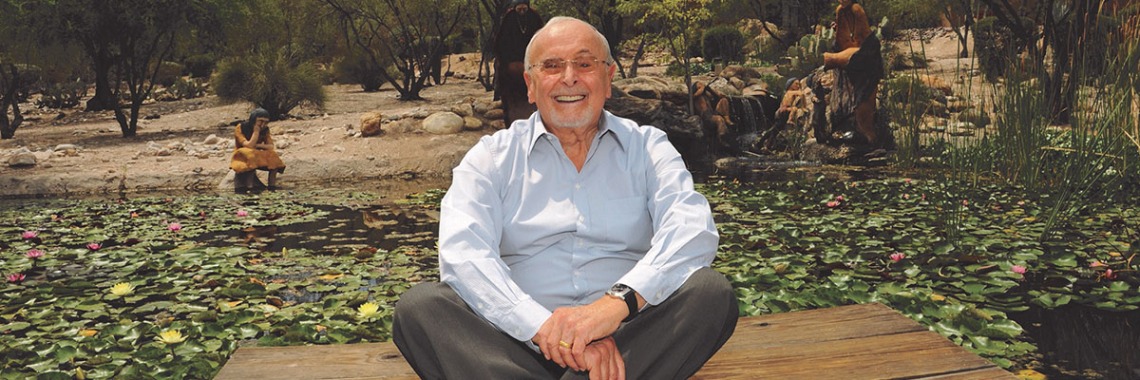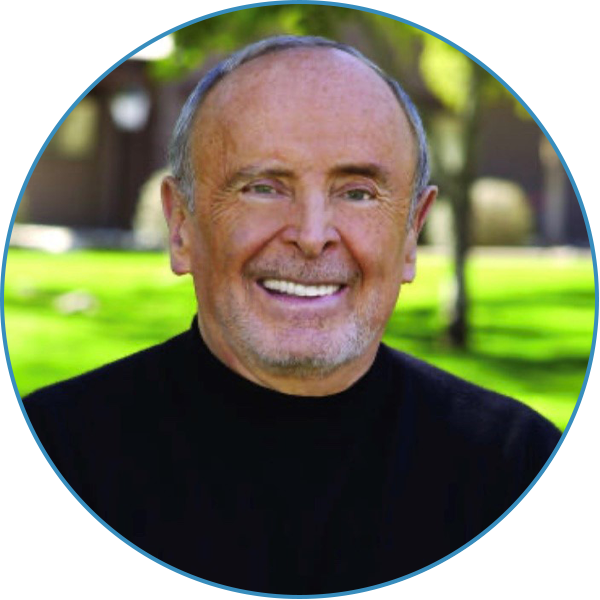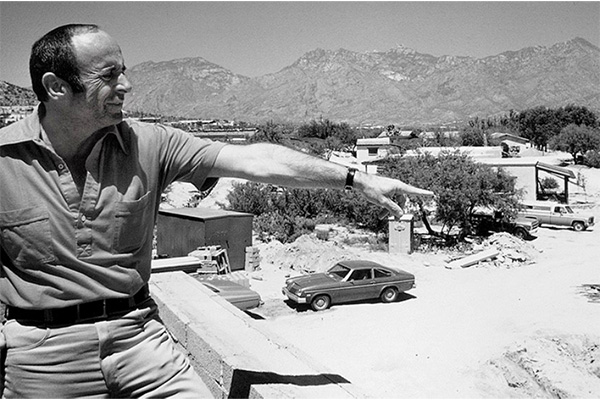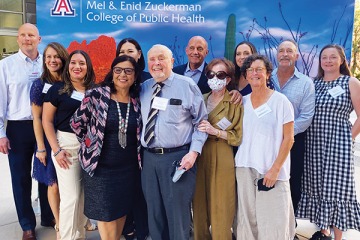Remembering Mel Zuckerman

Mel changed the world with his passion to promote health and wellness for all. His innovation, generosity and support of the Mel and Enid Zuckerman College of Public Health, and so many other organizations, has touched millions of lives. We are so grateful for the time we spent with him and are humbled by the legacy he left.
We honor Mel Zuckerman, a philanthropist, wellness pioneer and public health champion whose generosity launched the Mel and Enid Zuckerman College of Public Health, supported dozens of local organizations, provided public health students with scholarships, and recently funded a new Health and Medical Careers High School as part of the Pima JTED Career and Technical Education District.
As a founding funder of the College of Public Health along with his wife Enid Zuckerman, Mel changed the lives of more than 5500 public health graduates who now work to promote public health and prevent disease in all 50 states and around the world. His philanthropy continues through the Zuckerman Family Foundation that gives support for education, health, and wellness programs in our Southern Arizona community, programs that have touched thousands of lives.
Mel is survived by his wife, Enid; his two children, Amy and Jay (Stephanie); his grandchildren Nicole (Ken), Talia, Colton and Riley; his two great-grandchildren, Chloe and Asher; his sister and brother-in-law Paula and Arthur Molk; his many nieces and nephews; and countless friends.
Philanthropist and Public Health Champion

We are all grieving the recent loss of Mel Zuckerman. He was a visionary, a man of extraordinary compassion and generosity, and a transformative philanthropist. He passed away this month, March 2023. Mel and his wife Enid gave the funding that established the Mel and Enid Zuckerman College of Public Health. Since it launched in the year 2000, the college has educated thousands of students who have gone on to become leaders in public health and to improve health and wellness for millions of people in communities here in the United States and around the world! Research and programs from the college have transformed both our scientific knowledge and our approach to public health services.
We thank Mel for making all of this possible. He will forever be remembered for his kindness and for his public health legacy. He truly changed the world. The Zuckerman family will continue to build on his legacy, and the college will continue to grow and transform health and wellness. We give our profound thanks to Mel, to the Zuckerman family, and to the Zuckerman Family Foundation for their continued support of the college and our public health mission.
Mel's Path to Wellness
At age 40, Mel Zuckerman was told that his health risks were equivalent to those of a 65-year-old man. He was 40 pounds overweight, had acute asthma, did not exercise, and ate all the wrong things. But the somber announcement from his doctor did not sink in until almost a decade later when Zuckerman’s father died of lung cancer. “I watched my father hang his head in his hands and say over and over again, ‘If only I had listened to my doctors’ and ‘If only I had done this or that,’” Zuckerman said. “This was a true wake-up call for me.”

At the time, Zuckerman was a builder and real estate developer in Tucson. “I was just an out-of-shape, very unhealthy person,” he said. “I had no sense that there was anything I could do about it or that lifestyle could make a difference.” After his father’s death, however, Zuckerman decided to go to California and spend four weeks at a “fat farm,” a place that fed guests deprivation diets of 700 to 800 calories a day and encouraged them to exercise.
“I ended up having this incredible transformational experience,” Zuckerman said. “By the time I got home, I was not only 29 pounds lighter but I also was jogging three miles a day.” During his last week at the facility, Zuckerman called Enid and told her that when he returned to Arizona, he wanted to continue the healthier lifestyle and he asked her to fly out and join him to see what he was talking about. “I had never felt so good in my life,” he said.
When they returned to Tucson, they bought the Double U Ranch with the intention of reaching their new goal. “So 20 months and eight days later, we opened a place called Canyon Ranch,” he said. “(It was) a place where not only Enid and I could live a healthy lifestyle, but where we could also teach other people to do the same thing.” Although both were excited about the prospects of this new life and business opportunity, they also realized that they had little expertise in the area. That is when the relationship between Canyon Ranch and the University started.

The vision for this college was that it would have a national presence in the area of health education and health promotion. Our purpose is to try to get people to see health and prevention as an individual empowerment.


After Zuckerman formed a friendship with James E. Dalen, MD, former vice president of health sciences and dean of the UA College of Medicine, the two discussed the possibility of creating a college of public health. “This was Dr. Dalen's dream and he was asking me to support it.” In 1997, the Zuckerman’s agreed to donate $10 million to the UA Foundation, paving the way to the establishment of a College of Public Health at the UA. “The vision for this college was that it would have a national presence in the area of health education and health promotion,” said Zuckerman. “Our purpose is to try to get people to see health and prevention as an individual empowerment.” A few years later, the College was named in honor of Mel and Enid Zuckerman. Since then, the family has committed more than $30 million to the UA Foundation, primarily for the benefit of the College of Public Health.
As the founding funders of the College, Mel and Enid Zuckerman have had a profound impact on health and wellness across Tucson, around Arizona, and beyond. With their founding gift, they planted a seed that has grown, in the short span of 20 years, into a forest, an entire ecosystem of Departments and Centers and Programs and Research that benefits millions of lives. They really did change the world.

